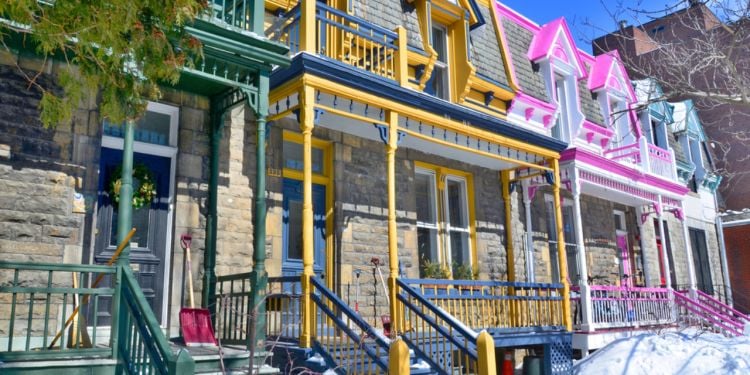
If you're planning to move to Quebec, have you thought about housing? Where will you live? In this article, Expat.com gives you some tips to guide you.
In Quebec, housing prices remain affordable compared to those in European metropolises or other Canadian provinces. However, there are local disparities, with some neighborhoods more popular than others, such as Plateau Mont-Royal in Montreal. What's more, rents have been rising steadily in recent years, especially in Montreal, where there is even talk of a housing crisis. According to this French article in the Journal de Montréal, rent prices in Quebec have soared by 13.7% in just one year, the biggest increase in 4 years, according to data compiled by the Regroupement des comités logement et associations de locataires du Québec (RCLALQ). In Montreal, average rents rose by 14% between 2022 and 2023. In Quebec City, rents rose by 19% in a single year. Other smaller municipalities, including Shawinigan, Rimouski, and Joliette, are also showing worrying rates of increase. So, even in small towns, you may need a little time to find an available and affordable apartment, whereas just a few years ago, housing was very easy in La Belle Province... But don't despair! With a little organization and perseverance, you'll find your cozy nest.
Prior to making a purchase, it's crucial to determine the type of home that suits you best and establish a budget you're not willing to exceed. Take the time to carefully consider whether buying a house or apartment is the right choice for you. Renting or even sharing might be more suitable initially. When visiting apartments, be well-organized and have essential documents such as your Canadian telephone number, identification papers, visa, and pay slips ready. Keep in mind that you never have a second opportunity to create a positive first impression!
Quebec housing search
First and foremost, you don't have to find accommodation before you arrive in Quebec. If you can afford it, you can rent a room in a hotel, hostel, or Airbnb for a few weeks and start looking when you arrive. You can also take out a temporary sublet while you look for permanent accommodation. It's best to take your time and be on the spot to avoid unpleasant surprises! To find accommodation in Quebec, look at the real estate ads in the free or traditional press. You can also use the classified ad sites on the Internet and scour the neighborhoods you've targeted: you'll be able to spot the signs on the doors with the type of accommodation and the number to contact. Take the time to visit several properties to make sure you're getting a good deal.
If you're on your own and opt to share an apartment, note that this is a widespread practice in Quebec. In this case, you'll be sharing your apartment with one or more people, so you'll be able to make friends quickly. What's more, most of the time you won't need to bring your own furniture and kitchen utensils. Prices advertised on shared-rental websites often (but not always) include the room, furniture, utilities, access to the rest of the house and kitchen utensils. Be sure to ask what's included in the price when you visit. You'll find roommate offers on classifieds sites like Kijiji, Logis Quebec, rentals.ca, kangalou.com, and Craiglist, on Facebook groups like Pvtistes à Montréal or Chambres à louer / colocation ville de Québec, or, if you're a student, on your university's bulletin boards.
When searching for housing in Quebec, consider the number of floors, especially if there's no elevator. Bedbugs can be a significant issue in the big cities during the summer, so it's advisable to communicate with your landlord. Inquire about the latest treatments and preventive measures taken in your residence. Additionally, ensure that the neighborhood suits your comfort level, with proximity to shops and convenient transportation access. Parking can be challenging in the city center, so if you have a vehicle, be sure to check this point.
Important information:
Be very careful if you're asked to pay to reserve accommodation before arriving in Canada. Ads with this requirement may turn out to be scams. A landlord is not supposed to ask for your social insurance number or a copy of your ID. The law prohibits security deposits, but your future landlord may ask for an advance on the first month's rent. Find out about your rights and obligations as a tenant from the Tribunal administratif du logement, formerly known as the Régie du logement. There, you can obtain forms such as the lease, lease assignment, and sublease contract. Finally, if you have a cat or dog, finding a rental will be more difficult. Many landlords in Quebec refuse to accept pets.
Types of housing in Quebec
There are many different types of housing in Quebec:
- The 1 1/2 is equivalent to a studio;
- A 2 1/2 is equivalent to an apartment consisting of a living room/kitchen and a bedroom; note that the bedroom is not always enclosed;
- A 3 1/2 is equivalent to an apartment consisting of a living room, bedroom and kitchen;
- A 4 1/2 is equivalent to an apartment with a living room, kitchen and two bedrooms;
- A 5 1/2 is equivalent to an apartment with a living room, kitchen and three bedrooms, etc.
Some apartments are situated in a semi-basement, essentially a half-basement with dormer windows. Half-basements are often more budget-friendly than conventional ground- or first-floor apartments, but they tend to be less well-lit. The terms "heated" or "unheated" and "Hydro included" or "not included" indicate whether the heating cost is part of the lease. If it's not included, you'll need to arrange with Hydro-Quebec to have heating installed in your apartment. Although it means an additional bill, the registration process with Hydro-Quebec is quick and can be done on their website. To delve deeper into the apartment lingo in Quebec, you can check out this article.
Leases in Quebec
Leases in Quebec typically run for one year, starting on July 1st and ending on June 30th. While you can still find housing outside of this timeframe, it's advisable to begin your search before July 1st to have a wider selection, especially in smaller towns. Some properties are rented without a fixed term or a written lease. In such cases, it's crucial to discuss rental conditions with the landlord before moving in. For your security, having a written lease is strongly recommended. The lease, agreed upon by both parties in French or English, should specify the date of possession, the lease duration, the rent amount, and the services included in the rent. Keep in mind that a lease binds you for its entire duration. However, you have the option to sublet your apartment or room with the landlord's approval (though you remain legally responsible for the lease if the subtenant fails to pay), or transfer your lease to a third party. Carefully review the lease conditions before signing, as this document can assist in resolving any disagreements with your landlord.
You must pay your rent on the first of each month, according to the amount indicated on the lease.
Good to know:
Cold water is free in Quebec. Electricity, gas, heating and Internet are at your expense. Some utilities may be included in the rent.
Very few landlords actually carry out an inventory of fixtures. Similarly, no security deposit is required: this is illegal in Quebec. It is, however, customary to repaint the walls before leaving. If your landlord wishes to increase the rent, he must notify you at least 3 months before the lease expires. If you have a dispute with your landlord, or are unsure about the regulations, you can turn to the Tribunal administratif du Logement, which provides useful information and advice on rental contracts.
Good to know:
If you're a temporary immigrant or WHP in Quebec, you may be asked for your Social Insurance Number (SIN) to check your credit history (which you don't have!) and refuse to rent accommodation on that pretext. Be aware that you don't have to show your social insurance number: it's confidential and should only be given to your employer, your bank or the tax authorities. If you are asked for it anyway, look elsewhere! To compensate for the lack of a credit history in Canada, you can show landlords letters from previous landlords, or any other proof that you are a good payer.
Buying a property in Quebec
It's much easier to buy a home in Quebec if you're a permanent resident or Canadian citizen. Canadian banks use your credit history to determine whether or not they can give you a bank loan. Newcomers have no credit history to begin with. In addition, the Non-Canadian Residential Real Estate Prohibition Act prohibits non-Canadians and temporary residents from purchasing residential real estate in census metropolitan areas (CMAs) and census agglomerations (CAs). Effective January 1st, 2023, this ban is valid for 2 years.
If you're looking to buy a house or apartment in Quebec, consider reaching out to a real estate agent to simplify the process. You can find them in the yellow pages of your phone book or through online searches. Once you've identified your dream home, your real estate agent will assist you in preparing the offer to purchase. If the offer is accepted, you'll require the services of a lawyer or notary to complete the property transfer into your name. Keep in mind that purchasing a house can be a substantial financial commitment, and it's crucial to include various costs in your budget. These expenses encompass annual property taxes, home insurance, registration fees, taxes associated with the property purchase, as well as ongoing costs for maintenance, heating, electricity, hot water, and sewage, along with fees for real estate agents, lawyers, or notaries, and other expenses related to any necessary renovations or improvements.
Before finalizing your purchase, it's essential to ensure there are no safety concerns, that the appliances are functioning properly, and that the water fixtures are undamaged. In Quebec, where winters can be harsh, adequate insulation is particularly crucial. Evaluate the condition of windows, double-glazing, and the effectiveness of snow removal facilities at the building's entrance. When making an offer on a house, it's best to include a condition that the sale is contingent upon the house passing an expert inspection. This gives you the option to cancel or modify your offer if the inspector identifies significant issues with the property. The inspector will provide you with a home inspection report, which you can go over with your real estate agent. This way, you can assess whether the house requires repairs that might impact the agreed-upon price.
Useful links:
Régie du Logement Montréal's official website
Buying your first home in Canada – A guide for newcomers Home buying checklist – A practical guide for newcomers
We do our best to provide accurate and up to date information. However, if you have noticed any inaccuracies in this article, please let us know in the comments section below.












Comments
1